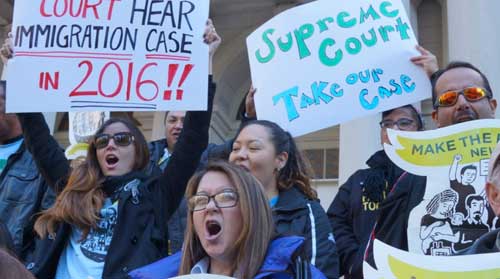
(Image: Gerardo Romo / El Diario)
Editor’s Note: This morning, the Supreme Court announced it reached a 4-4 split vote on the immigration case United States v. Texas, which addressed the DAPA (Deferred Action for Parents of Americans and Legal Permanent Residents) and expanded DACA (Deferred Action for Childhood Arrivals) programs introduced by President Obama in 2014. The court’s split decision means both programs, which would have provided undocumented community members with temporary deportation relief and work permits, have been put on hold. However, the original DACA program from 2012 has not been affected by the court’s recent decision. Coachella Unincorporated spoke to Megan Beaman, a local civil rights attorney and community activist, to find out what community members should know in light of the Supreme Court’s split decision.
- Remember Enforcement Priorities Remain In Effect. President Obama’s November 2014 enforcement priorities remain in effect, meaning immigration officials are directed to only deport people who fall into certain categories, including individuals with significant criminal histories and those who entered the U.S. after 2014.
- DACA Still Stands. The original DACA order from 2012 still remains in full effect, meaning no changes will be made to the status or rights of anyone already in the DACA program. Those who are eligible for DACA under the original order can still apply.
- Know Your Rights and Stay Safe. Undocumented community members must remain vigilant of their own rights and safety by protecting themselves while interacting with law enforcement and immigration enforcement agents. Among other things, do not sign anything without first consulting a lawyer, and do not admit to anything about your country of origin or immigration status.
- Keep Fighting. Even if you can’t vote, work to get family members, neighbors, friends and others registered to vote. Voting for candidates who will bring us the type of immigration reform that we deserve so that we can keep our families together.
- Don’t Lose Hope. In every movement for change and justice, we must overtime obstacles and experience failures before we eventually win—and in the end, justice does prevail. Mahatma Ghandi said, “First they ignore you, then they laugh at you, then they fight you, then you win.” The fight can be a long one, but justice will eventually prevail.
In the event you, or someone you know, are detained, be careful not to give up any of your rights without first speaking with an attorney.
- Exercise your right to not give your consent for search of your home, car, or person, to avoid unknowingly putting yourself or other undocumented family members at risk of detention or removal.
- Exercise your right to speak to an attorney before answering any questions or making any decisions in contact with immigration or police officials.
- Exercise your right to remain silent and not answer questions made to you by immigration or police officials, particularly questions about your immigration status or country of origin (birth).
- Exercise your right to NOT sign anything without receiving advice from an attorney about the consequences—you could unintentionally sign away your rights to future immigration relief.
- Exercise your right to call the consulate of your country of origin, who has a right to visit you, and who may be able to connect you to other resources.